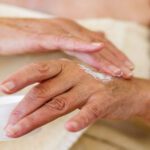Author : Dr. Sravya Chowdary Tipirneni, Consultant Dermatologist and Cosmetologist, Columbia Asia Hospital Whitefield
India
healthysoch
New Delhi, June 11, 2020 :
Since the start of the coronavirus pandemic, the world has changed and people are gradually adapting to a new lifestyle which involves more focus on safety and hygiene. The government has made it mandatory to wear protective masks, gloves and carry a sanitiser. People who venture out for various purposes, i.e. to shop for household needs, visit their offices or who are at the frontline of the pandemic, have to take all possible precautions to prevent spread of the disease. It will take some time to adjust to wearing face masks and people may initially find it uncomfortable. Those who have to wear face masks for long hours may start to experience other challenges, such as difficulty in breathing, skin irritation, sweating, and the feeling of being trapped. But we all know that the only way to keep ourselves safe from covid-19 is through using the mask.
There are so many frontline workers who are fighting the pandemic and are also facing terrible skin injuries due the long usage of surgical masks. A few of these are:
- Perioral dermatitis: When vapour, saliva, sweat, moisture gets stuck between the mask and the skin. It causes irritant dermatitis which leads to rashes, redness, scaling near the nose areas.
- Change in the skin pigment: Skin pigment might change as a result of excessive rashes, repetitive friction and dry skin.
- Itchy rashes: It is a type of contact irritant dermatitis, which is caused either due to excess sweat or dryness.
- Sores on the nose and behind the ears: Due to the elastic pressure, long time usage of masks can cause sores in these areas.
- Hives: It is an allergic skin reaction that occurs due to multiple reasons, causing itchy, swollen-pale red bumps on our skin with burning or stingy pain on the skin.
- Breathlessness: Due to the hot, humid climate it can be a difficult breathing for few people. People with lung issues like asthma and other chronic respiratory infections, it’s better to stay back at home as much as possible.
And all these issues can be taken care of by following these simple and healthy tips:
- Drink lots of water to avoid acne and dryness of skin.
- Eat fresh fruits and vegetables .
- Do not use any kind of face packs or chemicals if you have a rash on your skin.
- If you have an oily skin, keep washing your face at regular intervals.
- If you are a constant user of the mask, massage your face with a good replenishing moisturiser at bedtime.
- Use moisturizing body soaps and face washes.
- Keep using anti-fungal dusting powders to avoid fungal infections in sweaty, moist regions.
- If you are having a continuous burning sensation, then it’s time to consult a skin specialist.
- Wash and moisturize your ear lobes regularly
- Use a correctly- fitted mask, if your ear lobes are being forcefully folded, then it’s not the right size.
- Do not touch your face constantly, it can not only spread the disease but it can also spread germs that can cause skin infections.
Wearing face masks is the “new normal”, and this is likely to continue for quite some time. During this time, it is important for us to take all the precautions we can to ensure everyone’s safety and wellbeing. However, challenging it may initially feel to wear a face mask, we should continue to focus on our first priority – Fighting this Virus!
healthysoch





